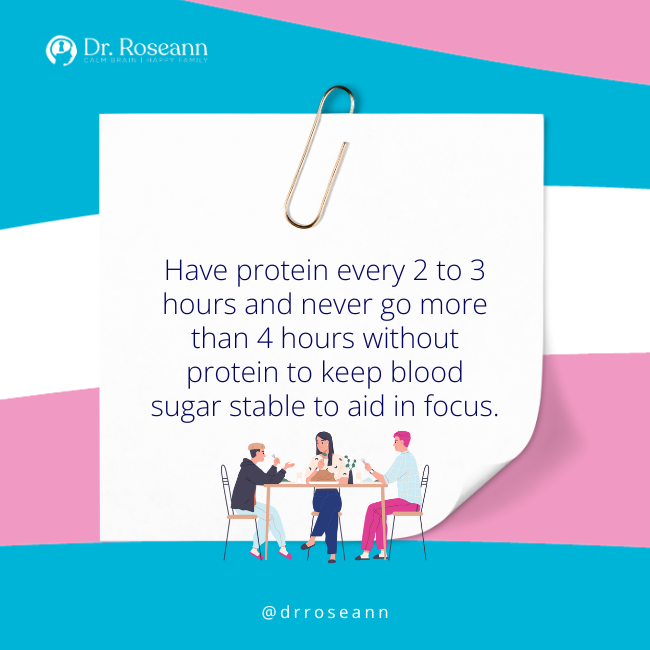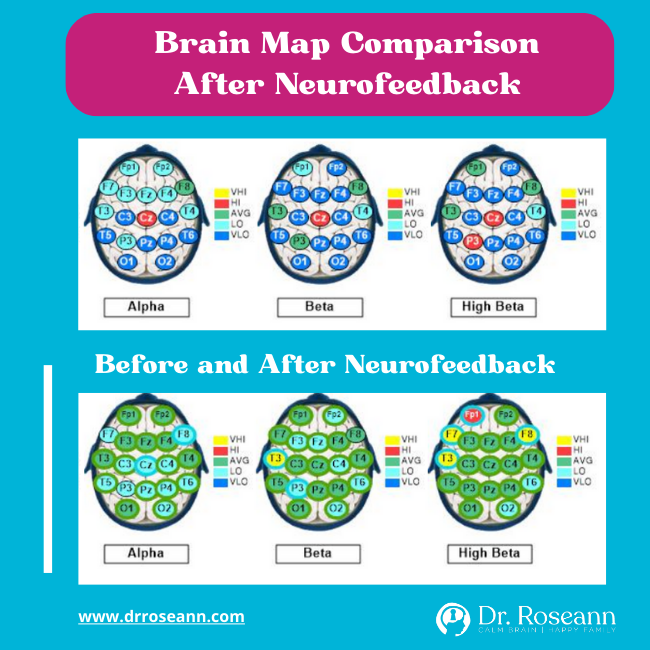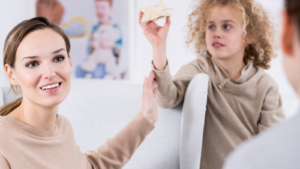Natural Treatment for ADHD: How Can It Help?
You love your child. You choose their food, school, doctor, and dentist carefully. You are intent on giving your child the best of everything. There’s no question that when you have the right information, you make the best choices, especially when it comes to any natural treatment for ADHD in adults and kids.
When your child has ADHD, your choices get a lot tougher. Add to this the myriad of information that is suddenly being thrown at you, from doctor recommendations to therapies and medications with side effects and names you can barely pronounce. It can all be overwhelming.
You want to help your child more than anything in the world. But do they need a ton of mind-altering chemicals dumped into their developing system? ADHD can be one of the toughest trials for parents and not everyone knows that there are natural meds for ADHD that can be used instead.
It's important to understand that while some parents consider medication as a valuable tool for managing ADHD symptoms, it is not the only option. Many parents want to reduce the chemicals tossed down their children's throats. Some are rightfully concerned about the plethora of possible adverse side effects. For these parents, learning how to naturally treat ADHD is the only way.
Several parents realize having their child's well-being tied to high-priced pharmaceuticals isn't an optimum long-term solution. No one wants to make their child a Big Pharma customer if they can avoid it. The good news is that you can avoid it and there’s a more effective and research-proven natural medication for ADHD out there. Let’s consider what one parent discovered.
Ben's Story
Karen was exhausted. She’d tried everything to help her son focus better. She met with the school and secured him a seat in the front of the classroom. Teachers gave him little reminders to pay attention and extra time on tests. His long list of not-so natural ADHD medications offered little success but serious side effects.
Initially, the ADHD medication had Ben buzzing around getting a ton of school work done. Two weeks later, he stopped eating during the day. His sleep became erratic. Sweet unfocused Ben vanished. Punchy and snarky Ben replaced him. Sure, school work was done but at what price? He was cranky and his emotions were a roller coaster. This was not the Ben his family knew and loved.
Karen spoke to his physician. For the next two years, they bounced from one medication to another, each with problematic side effects. Finally, Karen insisted her doctor consider alternative treatments for ADHD. Only then did he discuss Ben’s diet and trying supplements.
Karen could feel her blood boil. “Why didn’t you suggest this in the first place?” The doctor’s answer frustrated her. “Everyone wants meds and so that is what I give them”. Karen knew there had to be more information about natural ADHD treatments.
At home, she became a “Google MD.” With a little time and patience, she uncovered a treasure trove of well-researched natural treatments for ADHD. She started by reducing gluten and dairy. This brought about big shifts in Ben’s attention.
Could it be that easy? Yes! Karen found a pediatric functional doctor who is an expert in natural cure for ADHD that figured out what was interfering with Ben’s attention. More dietary tweaks and the addition of supplements and nutrients like magnesium were needed.
Ben responded when his name was called. He remembered to do little things, like flush the toilet, for the first time in his life. Things that Karen accepted would never happen were happening!
Karen discovered how to treat adhd naturally, particularly the power of neurofeedback, and that supercharged Ben’s health journey. With neurofeedback, Ben’s brain learned to act healthily. Ben wasn’t so distractible. He followed directions. No more zoning out.
His grades improved and without the frustrating side effects. The positives didn’t stop there. Ben was humming and snuggling again. Best of all, he felt proud of himself. For the first time in a long time, Karen felt relief.
She was able to break the cycle of worry that once defined her life. The whole family was less chaotic. Seeing the difference in Ben convinced the whole family to change their diet and exercise routine. In the end, everyone found themselves feeling healthier and pretty darn zen too!
Do Natural Remedies Work for ADHD?
Once you’ve decided to manage your child’s health journey using natural cures for ADHD, you may wonder where to start. This easy-to-understand primer offers you information Karen was denied. This information is not specific health advice.
It is offered so parents and caregivers know about options that are often overlooked. We recommend consulting a physician before using natural ways to deal with ADHD or beginning any supplement regime for information on specific dosages or possible drug interactions.
Scientific research has explored various ADHD natural treatments and their potential benefits in managing ADHD symptoms. One natural remedy for ADHD that has received attention is dietary adjustments.
Some studies suggest that eliminating artificial food additives and colorings (Kanarek, 2011), as well as adopting a diet rich in omega-3 fatty acids, magnesium, and antioxidants, may have a positive impact on ADHD symptoms.
In today's fast-paced world, even the healthiest looking snacks can be loaded weapons undermining our ADHD Child. Several colorings and preservatives are believed to increase hyperactivity. ADHD children can benefit from avoiding additives such as Red No. 40, Yellow No. 6, Yellow No. 10, and Yellow No. 5. Instead of food coloring and preservatives, strive to give your child food that can serve as ADHD home remedies such as lean meat, eggs, cheese, milk, nuts, low-fat yogurt, soy, and other protein-rich foods.
Natural Ways to Increase Dopamine in ADHD
ADHD is often associated with imbalances in neurotransmitters, such as dopamine. Parents who seek natural ways to help ADHD kids must increase dopamine levels as part of their child’s holistic treatment for ADHD.
Scientific research has explored various methods to enhance dopamine function and potentially alleviate ADHD symptoms. Some studies suggest that foods rich in tyrosine, an amino acid that supports dopamine production, can be beneficial for individuals with ADHD (Posner et al., 2009). A diet high in antioxidants, vitamins, and minerals may help support dopamine function.
Furthermore, meditation and mindfulness practices have gained attention for their potential to enhance dopamine function. Research indicates that these practices can help regulate dopamine levels, leading to better impulse control and emotional regulation in children and teens with ADHD.
Natural Alternatives to Ritalin for ADHD
Ritalin is a common prescription medication for ADHD. However, many parents are seeking natural alternatives due to concerns about its side effects. Some simply have a desire for more holistic and natural ways to treat ADHD. Scientific research has explored various ADHD natural remedies and treatments that can serve as alternatives to Ritalin (Anheyer et al., 2017).
The herbal remedies and essential oils that serve as a natural medicine for ADHD are lemon balm, valerian, passion flower, Ginkgo biloba, St. John's wort, and lavender. These are among the herbs that have shown potential in managing ADHD symptoms. However, the efficacy of these natural alternatives varies from person to person.
It's essential to consult with a healthcare professional to determine the most suitable natural alternatives for ADHD management. A personalized natural ADHD treatment plan, which may include a combination of holistic therapies and natural ADHD remedies, can provide the best outcomes for individuals seeking alternatives to Ritalin.
Natural Supplements for ADHD
When someone struggles with focus, attention, and impulse control, there are always nutrient deficiencies and difficulties with nervous system regulation. Direct nutrient supplementation can go a long way in powering up the brain and treating ADHD naturally so that you or your child can think clearer, hear directions, and get work done.
Whether supporting serotonin deficits, vitamin deficiencies or just trying to make your nervous system healthy, supplements are a natural and effective way to help the brain focus. When it comes to natural ADHD remedy, here are some that are worth exploring:
1. Omega-3 Fatty Acids
Omega-3 fatty acids are essential for brain and nerve cell function. Our body is incapable of making these critical nutrients, and people rarely get enough of them through their diet. A good rule of thumb when using Omega-3 supplements as natural medications for ADHD is to look for one with an EPA amount that is two to three times the DHA amount.
2. Protein-Rich Diet
Because protein prevents blood sugar surges that contribute to hyperactivity, a diet rich in protein can significantly assist an ADHD child. Vegetables, fruits, legumes, and whole grains can help stabilize a child's energy levels when incorporated properly into the diet.
It is important to have protein every two to three hours and never go more than four hours without protein to keep blood sugar stable to aid in focus.

3. Melatonin
Children struggling with ADHD often experience erratic sleep patterns. Melatonin is a hormone secreted at night by the pineal gland and is needed for the regulation of the sleep-wake cycle. Research indicates melatonin improves sleep for those with ADHD (Weiss et al., 2006). Long-term research demonstrates its continued effectiveness over time. When children get a good night’s sleep, so do parents and caregivers.
4. Iron
Iron is a key factor in the creation of neurotransmitters, such as serotonin, norepinephrine, and especially dopamine. Dopamine imbalance can lead to muscle and behavioral problems. The number of dopamine receptors in the brain correlates with the iron levels in the brain. It’s for this reason why iron is considered as one of the most effective natural medicines for ADHD.
5. Vitamin B6
B vitamins contribute to a healthy nervous system and play a vital role in both attention and executive functioning. B-6 assists in the manufacture of neurotransmitters, such as serotonin. The delicate balance between dopamine and serotonin is key to attentiveness and helps calm hyperactivity, which makes it among the viable natural remedies for focus.
6. Vitamin C
Aside from being an antioxidant that every child should have in their diet, the ADHD child can benefit from additional amounts of this building block of neurotransmitters. This makes Vitamin C a well-regarded ADHD natural medication.
7. Magnesium
Research show that magnesium play a role in managing ADHD symptoms. Many studies have explored the potential benefits of magnesium supplementation in improving focus and reducing hyperactivity (Starobrat-Hermelin & Kozielec, 1997).
Other Natural Remedies For ADHD
There are many effective and proven natural ways to help with ADHD so your kid can be more focused and organized, not to mention a better listener who finishes things in no time! Each person’s needs are unique and require an individual holistic approach to ADHD. But starting with a QEEG brain map is the best way to know what you or your child needs. Here are some therapies that can complement natural solutions.
Behavioral Therapy
A wide range of therapies for children and adolescents fall under this term, but most if not all of them function on a similar principle. Behavioral therapists reward children for desired or appropriate behaviors while ignoring inappropriate or unwanted behaviors. The theory is that the child will be encouraged by the reward to repeat the appropriate behavior, and less desirable behaviors will fade away.
Neurofeedback
Also referred to as “brain training” programs for ADHD, this is a non-invasive, medication-free therapy. As discussed above, neurofeedback is very much like taking your brain to the mental gym to workout.
Initially, the therapist will create a brain map to compare the child's brain to brain wave patterns stored in a database. This facilitates an individualized treatment plan for the patient.

Expressive Art Therapy
Based on the principles of therapeutic play, this therapy employs drawing, painting, and other forms of expressive play in which the therapist helps children address issues with managing behavior, interpersonal skills, and self-awareness. Used as a part of a comprehensive treatment program this form of therapy can reduce stress, address emotional problems, and assist children in learning to self-regulate.
Executive Functioning Therapy
Executive functions are central processes intimately involved in giving organization and order to actions and behavior and these skills can be taught. They support complex cognitive functions. These are involved in our cognitive processes including planning for the future, strategic thinking, the ability to inhibit or delay responding, self-regulation, initiating behaviors, and shifting between activities flexibly. Without it, any task that requires planning, organization, memory, time management, and flexible thinking becomes a challenge.
Exercise
It's a well-known fact that exercise is a great stress reliever and endorphin boost. Lesser known is the fact that a moderate amount of exercise increases dopamine levels, as well as, elevating levels of serotonin and norepinephrine. This means even a simple thirty-minute walk three to four days a week can be effective for the ADHD child. Think of exercise as natural stimulants for ADHD.
How Can I Help My Child With ADHD?
From school problems to trouble listening at home to difficulty getting along with others, having a child with ADHD can make parenting even harder. It may be challenging to know the difference between clinical ADHD and focus difficulties, so understanding how ADHD is diagnosed is important.
There are evidence-based supplements and home remedies for ADHD that can help your child alert differently, focus, and concentrate. The BrainBehaviorResetTM Program offers holistic ADHD treatment. It includes neurofeedback, PEMF, and magnesium supplementation to help reduce and reverse symptoms.
For decades, these holistic methods can be regarded as natural ADHD meds as they have accumulated thousands of research to support their efficacy. The BrainBehaviorResetTM Program has been one of the most effective natural ADHD treatment for adults and children alike.
Parent Action Steps
☐ Get a professional evaluation to diagnose and understand your child's ADHD.
☐ Educate yourself about the right ADHD natural treatment to support your child.
☐ Create an organized and distraction-free environment at home.
☐ Consult a holistic healthcare provider for natural ADHD medicine recommendations.
☐ Use behavioral therapy as a natural help for ADHD for developing coping strategies.
☐ Adjust your child's diet with a focus on nutritious foods.
☐ Encourage regular physical activity to improve focus and dopamine levels.
☐ Introduce mindfulness practices for impulse control and emotional regulation.
☐ Maintain open communication with your child's school for necessary support.
☐ Show patience, empathy, and support, while celebrating your child's achievements.
☐ Take the ADHD Quiz to know if your child has ADHD or something else.
☐ Use the Solutions Matcher to get a personalized treatment plan for your child.
Citations
Anheyer, D., Lauche, R., Schumann, D., Dobos, G., & Cramer, H. (2017). Herbal medicines in children with attention deficit hyperactivity disorder (ADHD): A systematic review. Complementary Therapies in Medicine, 30, 14–23. https://doi.org/10.1016/j.ctim.2016.11.004
Kanarek, R. B. (2011). Artificial food dyes and attention deficit hyperactivity disorder. Nutrition Reviews, 69(7), 385–391. https://doi.org/10.1111/j.1753-4887.2011.00385.x
Posner, J., Gorman, D., & Nagel, B. J. (2009). Tyrosine Supplements for ADHD Symptoms With Comorbid Phenylketonuria. The Journal of Neuropsychiatry and Clinical Neurosciences, 21(2), 228–230. https://doi.org/10.1176/jnp.2009.21.2.228
Starobrat-Hermelin, B., & Kozielec, T. (1997). The effects of magnesium physiological supplementation on hyperactivity in children with attention deficit hyperactivity disorder (ADHD). Positive response to magnesium oral loading test. Magnesium Research, 10(2), 149–156. https://europepmc.org/article/med/9368236
Weiss, M. D., Wasdell, M. B., Bomben, M. M., Rea, K. J., & Freeman, R. D. (2006). Sleep Hygiene and Melatonin Treatment for Children and Adolescents With ADHD and Initial Insomnia. Journal of the American Academy of Child & Adolescent Psychiatry, 45(5), 512–519. https://doi.org/10.1097/01
Are you looking for SOLUTIONS for your struggling child or teen?
Dr. Roseann and her team are all about science-backed solutions, so you are in the right place!
Grab your complimentary copy of
147 Therapist-Endorsed Self-Regulation Strategies for Children: A Practical Guide for Parents
You can get her books for parents and professionals, including: It’s Gonna Be OK™: Proven Ways to Improve Your Child’s Mental Health, Teletherapy Toolkit™ and Brain Under Attack: A Resource For Parents and Caregivers of Children With PANS, PANDAS, and Autoimmune Encephalopathy.
If you are a business or organization that needs proactive guidance to support employee mental health or an organization looking for a brand representative, check out Dr. Roseann’s professional speaking page to see how we can work together.
Dr. Roseann is a Children’s Mental Health Expert and Licensed Therapist who has been featured in/on hundreds of media outlets including The Mel Robbins Show, CBS, NBC, PIX11 NYC, Today, FORBES, CNN, The New York Times, The Washington Post, Business Insider, Women’s Day, Healthline, CNET, Parade Magazine and PARENTS. FORBES called her, “A thought leader in children’s mental health.”

She coined the terms, “Re-entry panic syndrome” and “eco-anxiety” and is a frequent contributor to media on mental health.
Dr. Roseann Capanna-Hodge has three decades of experience in working with children, teens and their families with attention-deficit hyperactivity disorder (ADHD), autism, concussion, dyslexia and learning disability, anxiety, Obsessive Compulsive Disorder (OCD), depression and mood disorder, Lyme Disease, and PANS/PANDAS using science-backed natural mental health solutions such as supplements, magnesium, nutrition, QEEG Brain maps, neurofeedback, PEMF, psychotherapy and other non-medication approaches.
She is the author of three bestselling books, It’s Gonna Be OK!: Proven Ways to Improve Your Child's Mental Health, The Teletherapy Toolkit, and Brain Under Attack. Dr. Roseann is known for offering a message of hope through science-endorsed methods that promote a calm brain.
Her trademarked BrainBehaviorResetⓇ Program and It’s Gonna be OK!Ⓡ Podcast has been a cornerstone for thousands of parents facing mental health, behavioral or neurodevelopmental challenges.
She is the founder and director of The Global Institute of Children’s Mental Health, Neurotastic™Brain Formulas and Dr. Roseann Capanna-Hodge, LLC. Dr. Roseann is a Board Certified Neurofeedback (BCN) Practitioner, a Board Member of the Northeast Region Biofeedback Society (NRBS), Certified Integrative Mental Health Professional (CIMHP) and an Amen Clinic Certified Brain Health Coach. She is also a member of The International Lyme Disease and Associated Disease Society (ILADS), The American Psychological Association (APA), Anxiety and Depression Association of America (ADAA) National Association of School Psychologists (NASP), International OCD Foundation (IOCDF).
© Roseann-Capanna-Hodge, LLC 2023











